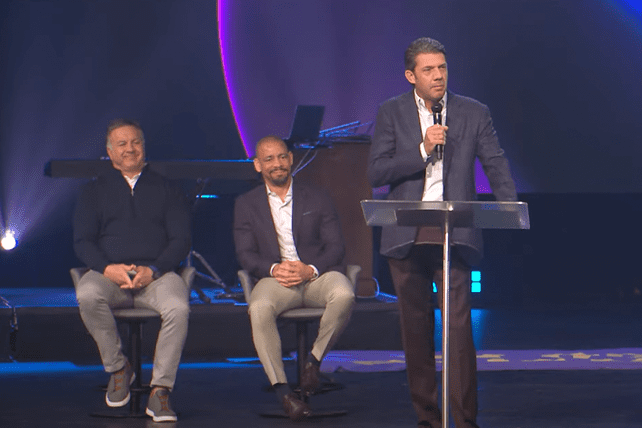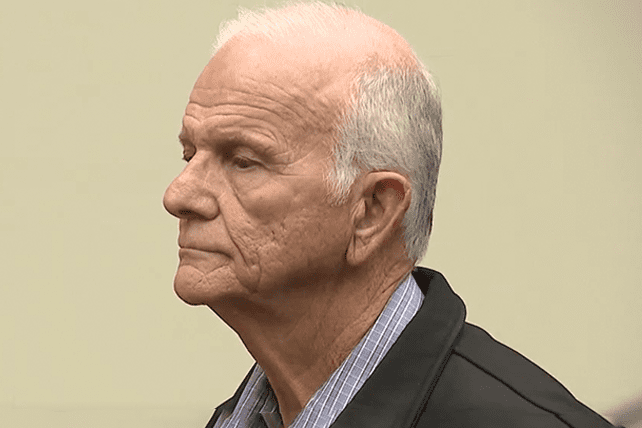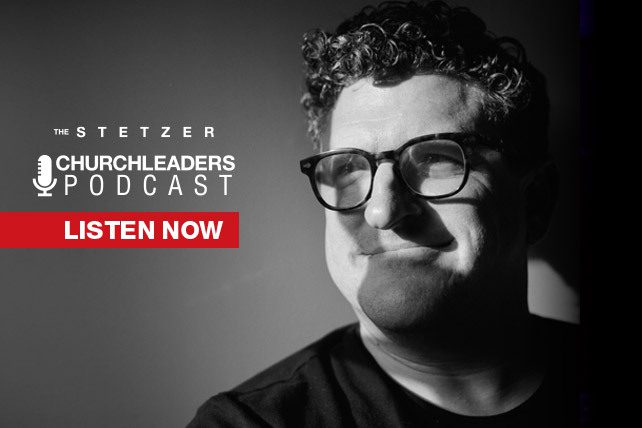Mike Cosper on The Stetzer ChurchLeaders Podcast.mp3: this mp3 audio file was automatically transcribed by Sonix with the best speech-to-text algorithms. This transcript may contain errors.
Voice Over:
Welcome to the Stetzer Church Leaders Podcast, conversations with today’s top ministry leaders to help you lead better every day. And now, here are your hosts, Ed Stetzer and Daniel Yang.
Daniel Yang:
Welcome to the Stetzer Church Leaders Podcast, where we’re helping Christian leaders navigate and lead through the cultural issues of today. My name is Daniel Yang, national director of Churches of Welcome at World Relief. And today we’re talking with Mike Kasper. Mike’s known for producing and hosting the podcast The Rise and Fall of Mars Hill. He serves as the director of podcasts at Christianity Today and co-hosts The Bulletin. Mike’s authored several books, including Land of My Sojourn, The Landscape of a Faith Lost and Found, and his latest is The Church in Dark Times Understanding and Resisting the Evil That Seduced the Evangelical Movement. If you enjoy our interviews, make sure you like and follow us on Apple Podcasts. Now let’s go to Ed Stetzer, editor in chief of Outreach Magazine and the dean of the Talbot School of Theology.
Ed Stetzer:
Thank you, Daniel, for the introduction. Mike Cosper. We have been like, I’ve known you since you were a teenager, right? I mean, what is it like 19 years old? You were over my house when I was a professor for in Louisville for three years.
Mike Cosper:
You never had me to your house, but I did you in my. My friend Nathan Cuillo. Shout out to Nathan Cuillo and Quills coffee. I met you in in Nathan’s living room.
Ed Stetzer:
Oh, okay. It was a living room. Okay. I thought it was my house because. But. Okay. That’s fascinating. Met there. You’re just a kid.
Mike Cosper:
I have never been invited to the Stetzer home.
Ed Stetzer:
Well, there’s there’s a there is the restraining order. But anyway, um, moving on from there. So, so. And now, I mean, it’s so funny to kind of watch your journey. First of all, I make I make fun of you in one of my. I mean, years ago, I had this road sermon that you’ve heard me do and, and I talk about, you know, sojourn and, and your music that you played and then you didn’t want to sing any, you know, any commercial music. And then the joke I make in the sermon is and now they have their own, you know, they have their own album out and so and so you knew that but but and we kept in touch. But your life is we’re going to get to the topic of the book in just a minute. But your life’s kind of a weird journey that in many ways, of course, shapes the tone and tenor of the book. So you’ve been involved in all this media for two decades, you know, how does this kind of shape your perspective on the issues facing our churches today?
Mike Cosper:
Yeah, I mean, I don’t know, the book is much more a reflection of how those views have been shaped rather than shaping of the of the views. Um, but yeah, I mean, the church today is a media phenomenon, like the church has to function as a media phenomenon, whether they like it or not. And, you know, any church that the minute you start putting your sermons available online or sending emails or whatever else, like you’re, you’re trafficking in, you know, this, this, this new normal, Um, which can be used for good and can be used for ill and and um. Yeah, that’s that’s that it’s a complicated. It’s a complicated question, I guess. Yeah.
Ed Stetzer:
But it’s I mean, it’s it’s complicated, but you’re like, you’ve rushed into all of that, you know, it’s it’s the idea of this. I mean, even your expression that, you know, the church is a media experience now, which is something that we wouldn’t have said 50 years ago. And so, you know, I’m not saying you’ve rushed in uncritically, but you’ve certainly rushed in. I mean, the one of the world’s leading podcasts critiquing church. Um, now you have your own weekly podcast. You’ve done different forms of media. So, I mean, has that has, has walking through all that, like, how’s your heart? I mean, is it is it I’m concerned. I’m I think it’s great. I think it’s opportunities that all of the above because I mean, again, the title of the book is, you know, not exactly Sunshine and roses here. It’s the Church in Dark Times, but we’re going to get to subtitles understanding and resisting the evil that seduced the evangelical movement. But media certainly plays a part in your book and in this journey. So what are your current posture towards the very thing that you’re involved in?
Mike Cosper:
Yeah, I mean, I make a point in the book, I mean, for what it’s worth, like, I make a point in the book to to really sort of hold out the example of Billy Graham as somebody who from, from the very beginnings of modern media, understood its complexity, understood its temptations, um, really kind of created a whole set of boundaries and restrictions around himself to try to protect himself from the temptations that came from media. Um, and at the same time, you can’t understand the Billy Graham phenomenon without without recognizing that it was a media phenomenon. Like, he he saw it as an opportunity and unapologetically embraced the opportunity of media. So, you know, it’s like anything. Like there are there are trade offs and for the church to function, um, for the church to function in our particular moment, um, they have to figure out, okay, what are we going to do about media? Um, maybe, you know, there are some churches that are like, they’re going to embrace that, like sort of particular Baptist fundamentalist Baptist posture and say, we’re not doing anything online and we would never do multiple services, and we certainly wouldn’t, you know, livestream anything or whatever. But that’s the exception. The rule is church is trying to figure out, okay, how do we use this stuff judiciously? And, um, you know what? Well, that’s an element of what the book is talking about. The book is trying to sort of push at issues that are larger and broader than that, like the the framing behind all of that. Right, right. That says like, hey, what, what what is the church? What is the church about? What is what is possible for the church? What what can the church accomplish? And when when those questions, when the answers to those questions become really grandiose, it becomes really dangerous. Yeah.
Ed Stetzer:
And I think what, you know, it does address those questions, but also deeply addresses what happened to the church. And so, you know, so part of that, I want to get a little background in a sense, I’m also, I guess, asking what happened to you that you think that the church is in dark times? What is it? The famous question who hurt you? But you know, the of course you did the Rise and Fall of Mars Hill, which we’ve had you on the podcast to talk about that. And did that relate in any way or how did it relate to your decision to write The Church in Dark times? And maybe, if you can, what about your own church experience? How does that relate to writing the church in dark times?
Mike Cosper:
Yeah. So, um, for those who are unfamiliar with it, like my my story, I helped plant a church, uh, under the leadership of wise mentors like Ed Stetzer, um, helped plant a church mentor.
Ed Stetzer:
To be clear, I think we. I didn’t even know where we met. So let’s not put me in the mentor category.
Mike Cosper:
Anyway, I’ll still blame you. So year 2000 helped to plan a church. I was on staff there for 15 years. Um, our our church was one of the like we experienced and I mean this genuinely like we experienced the best of the church planting boom of the 2000. We, um, we planted at a time where there weren’t a lot of churches like us in the city of Louisville. The church blew up. Um, by the time I left, we had almost 4000 people meeting at five locations. Um, live preaching at every location. We never did video venue. Um, and then, you know, the church had this really vibrant arts and culture ministry as well. Like, we ran a center for the arts, and we started Sojourn Music. And you can go to Spotify and check out Sojourn Music, and you’ll be able to see what we did over the years. A lot of a lot of original songs, a lot of hymns, things like that. Um, I, you know, I treasure those days. I mean, I treasure that experience. It was, um, some of the best years of my life were were spent in that ministry, and, you know, it. It ended in a season where the church went through some unhealth. The church was probably unhealthy for the last 2 or 3 years that I was there. And then, um, within 2 or 3 years of my exit, I went through a bunch of transformations. And I think it’s I’m really happy to say, like, I’m still a member at this church. I still attend, uh, a sojourn campus. And I think all of those sojourn pastors would say, like, yeah, we went through a hard season and we, um, came out the other side in a, in a in a solid place. That definitely has affected the way I’ve approached it definitely affected the way that I approached the Mars Hill story, because what I recognized in the Mars Hill story.
Ed Stetzer:
Little connection with people is that sojourn was in acts 29 church. And so some connection there. Not now. And it wasn’t it didn’t stay for too long. But but so sometimes that connection is, you know, and then you do the rise and fall of Mars Hill. So talk to us about that right.
Mike Cosper:
Yeah. So we we joined acts 29 after we had been planted. We were not planted by them, but we joined them in like for I think Darren Patrick recruited us to come into the network in zero four. And then we left around 2010, um, as things were starting to get a little wild and hairy in there. And, and because we were kind of compelled and, um, felt called to, to start our own church planting network with a different vision. Um, but yeah, that definitely affected it. And, and what that did for me, I mean, the reason, I mean, for sure, the reason that I was able to do what I did with The Rise and Fall of Mars Hill was because during those years of participation in acts 29, I was able to build a lot of relationships with pastors, uh, in the acts 29 network and at Mars Hill. That became kind of key figures, key voices in that, in that story. And, um, and I would just say that, like, I think the importance of the rise and fall of Mars Hill is that it’s a story that’s very familiar to lots of pastors in lots of different situations. Um, not just Mark Driscoll, not just acts 29, not just a certain kind of church brand of church. Like there is a mars hill. Like what you see in Mars Hill is that there’s a way in which, like a certain ideology kind of takes hold of the leaders of a church and creates a permission structure in which all kinds of, you know, badly motivated activity can take place from there. Yeah.
Ed Stetzer:
And this is and that’s a key theme that kind of runs throughout the book. He talks about the banality of evil and more. Um, but when I think most people read the books coming out after the election. We’re recording this before the election. The reason I say that is we don’t know who’s going to be elected president at the time of this recording, but this will be out, like right after the election.
Mike Cosper:
But and we still may not know who the president is when it comes out either.
Ed Stetzer:
That’s fair. That’s fair. Wow, wow. That hurt, that hurt, that wounded my soul right there, brother. I’m not sure I’m ready for that again. Um, but but so here’s the thing. When people read the church in dark times, I will. I know that people who don’t know you might think, oh, this is a book that the right wing would write or publish, or maybe even, you know, more far right and say, we’re in dark times because of the rise of progressive and liberal ideologies is crushing. And, you know, this, this could be our last election. We’re going to lose our freedom. It’s it’s a dark time. And then people on the left would say, well, you know. Yeah, the authoritarianism. And if, you know, if we’re going to, we’re going to lose our freedom, you know, Nazi, all this sort of stuff. So it’s dark times and then there’s people I don’t know, I wouldn’t say center, but they could be like center and to each side there, like just the craziness all around us is dark times. So what? And again, I think, you know, people you know, people follow you on Twitter. You know, they’ve seen you and I found helpful you talking about this as an election of extremes and, you know, overplaying to the base and all that sort of stuff. So knowing that we don’t know who’s going to be president, but there’s hopefully will be have decided by then. What’s the dark times? Is it political? Overwhelmingly partly. Let’s start there.
Mike Cosper:
Yeah. So so there’s there’s a sense in which like the, the dark times have nothing to do with politics whatsoever. Um, uh, the politics are, I would even say like the politics are downstream of other sort of cultural realities in which a, a, a world full of people who are detached from, uh, uh, detached from a sense of like, uh, meaning and purpose. Um, they’re looking for something. You know, David Foster Wallace has this great quote where he says, we’re all dying to give ourselves away to something. And that’s a really dangerous reality. Um, particularly in a world where, where, where people don’t have these, like, deeply rooted senses of connection to to place, to family, to country, to vocation, to church, to, to whatever else and the, the power. And again, like the reason Mars Hill was such a great example of this, the power of Mars Hill was it provided a story for lots of people, especially young men, but but certainly broader than young men. It provided a place for them to find like a sense of story and purpose and belonging. Um, and it was it was wrapped around a certain vision of Christianity, a certain vision of masculinity.
Mike Cosper:
Um, which was really embodied by and represented by Mark Driscoll. And the problem was because it was so, so enmeshed, like that vision for what the church was about, because it was so enmeshed with Mark, it couldn’t outlive Mark. So when Mark had to, you know, when Mark left, the church collapsed and fell apart. And we’ve seen similar examples of this in other places. Um, you see this in political movements all the time. Like if you look throughout the 20th century, you see political movements that kind of function in the same way. So what I’m trying to warn the church with, with a book like this is, is not to say like politics are the problem or a certain kind of church or church growth strategy is the problem. What I’m trying to say is I’m trying to say ideology is the problem. These grandiose visions where we say, look, if we just if we can just get this one thing right, we can reach the city, we can reach the world, we can transform all of these things. That grandiosity itself is what, uh, what I think becomes so destructive down the line.
Ed Stetzer:
Yeah. Well, and I think that it’s not hard to see that people are becoming much more ideologically motivated. Now, people say that because they’re probably think someone else got there’s always this cycle of blame. I wrote an article in Outreach Magazine in my editor’s column on The Great Sort, where in the past, you know, people sorted themselves denominationally in the 50s, you could go to Lutheran Church, you go to another town, you find a Lutheran church. They sorted themselves out, probably more theologically and methodologically in the 80s and beyond. I want to find something that’s if I’m an evangelical, something that holds similar beliefs and sort of worships like I’m used to worshiping, but I could become a methodist and go non-denominational or whatever. But today, increasingly, people are sorting themselves ideologically, so pastors who are listening all have had people in the last five years leave their church to go to churches that are going to be more ideologically aligned with the people who left. And, you know, same. I mean, literally, they have the same ideological beliefs, even worship the same. But I need someone who punches harder to the left, or I need somebody who speaks up on issues that are important about my views of justice or whatever it may be. So part of that we’ve seen, but you’ve talked some more about how at it’s extremes, and you talk a lot about the power of the ideological movement itself. So and so what characterizes them and what makes them so dangerous? Because I think, I mean, I have an ideology. So what makes ideological movements so dangerous?
Mike Cosper:
Yeah. You know, something that I’ve thought a lot about this and I think if I, uh, if I had another round of edits on the book, I probably would take the time to do this.
Ed Stetzer:
I know your editor. So, you know, we can talk to her.
Mike Cosper:
Yeah. Well, um.
Ed Stetzer:
And by the way, she wrote a book called celebrities for Jesus. I’m coming back now because I was going to. And what was fascinating was she interviewed me for the book about Billy Graham, and when the book came out, it was the greatest marketing thing I’ve ever received. So if you’re watching this, you can say, that’s the greatest marketing Caitlin I’ve ever seen. Caitlin Beatty. She sent me and I guess everybody, because I saw people on Twitter like an album, like a like a full size record from Billy Graham. Celebrity for Jesus. And so I’m guessing whoever she talked to did that. So anyway, super cool. Sorry, but back to your if you had more time to make edits. So sorry for that.
Mike Cosper:
So so what I would do is I would distinguish between like lowercase ideology and uppercase ideology. And when I’m when I talk about ideology in the book and the ideology that I think is so problematic, it would be this uppercase I thing. And Miroslav Volf actually has defined it. He said, um, I think he’s provided the best definition of it. He said, it’s a little idea that’s supposed to change the world. It’s like, you have this. You have this one sentence, uh, this one sentence vision that says if we just get this issue right, it’s going to transform everything. So in politics, you know, in the 20th century, in politics, what you saw was for for Stalin, it was like you got to get rid of the bourgeoisie and the capitalists. And then, you know, socialist utopia is on the other, you know, communist utopia is on the other side of all of this. Um, for Hitler, it was you got to get rid of the Jews. Um, they’re this parasitic race in, in Europe. If we can get rid of the Jews, um, then the the superiority, the superiority of the Aryan race is going to prove itself. And, you know, the Third Reich is going to reign forever and ever, blah, blah, blah. The church does weird, kind of funny versions of this, um, and, you know, and again, like, Mars Hill ends up being an interesting example of, of the case because Mark’s whole idea was he said this all the time.
Mike Cosper:
He would say 90% of the world’s problems are caused by young men, which is true. I mean, I think he’s actually right on that. I think Mark was right on all kinds of stuff, frankly. Um, but what what he then did was he then said this idea build a church around young men, um, reach the young men. You’re going to change the city. You’re going to change the world. Became this, like, controlling feature. And so what what an ideology does is, is it then creates this kind of circular logic where anytime a criticism comes in, hey, maybe you should be more sensitive to the needs of the women in your church. It enters into the sort of the jaws of this logic and gets chewed up and gets, you know, and then the response that comes back is, oh, so you’re, you know, you’re a feminist or you’re a liberal or you’re weak or you’re not man enough or all this. And like anybody inside that church would tell you, those kinds of responses were very, very, very common for, for for critics and worse. I mean, there’s worse, uglier versions of it that I won’t sort of repeat here. Um, that happens all the time, though. It happens with all kinds of ideas, I think. I actually think Bill Hybels is a really interesting example of an ideological vision capturing a church and and leading its growth. For for Hybels, it was, you know, Hybels had this origin story that he loved to tell, and he told it all the time.
Mike Cosper:
I, I had a path into the business world. I was going to be a successful businessman. But I put all that aside. I put all that aside to, uh, to plant a church. Um, and and so his church became about reach business leaders and entrepreneurs and you’ll change the world. And, um, what what what becomes very easy. Like part of what ideology does is it can be, you know, it’s like a it’s like a black hole, like it bends gravity in its in its direction. The logic of a certain kind of story starts to bend gravity. It starts to bend morality so that, you know, when, when concerns come up or when conflicts come up, or when the leader themselves starts to behave in ways that are disqualifying you. The gravity of the ideology. This is so important, right? People are going to hell. We don’t want to we don’t, we don’t. We don’t want to disrupt the momentum of the mission and the movement because people are going to hell. Um, and, and so that’s important enough that we will ignore whatever the yellow flags are or red flags are. And it happens over and over and over again in ministries. You can you and I could probably sit here for an hour and name names and get very depressed doing so. Yeah.
Ed Stetzer:
And it is depressing. I mean it is, but and I would say that I mean, the book is not a sequel to The Rise and Fall of Mars Hill. It’s it’s. But it does deal a lot with issues of church abuse. But not just church abuse is bad. But what what is the ideological frameworks that create the cultural context where church abuse is? It can happen. And it appears that that was what was.
Mike Cosper:
That was what was so important to me was the question I got over and over again is, how does this happen? Right? How does the church find itself in a place like this?
Ed Stetzer:
The sets are church leaders. Podcast is part of the Church Leaders Podcast Network, which is dedicated to resourcing church leaders in order to help them face the complexities of ministry. Today, the Church Leaders Podcast Network supports pastors and ministry leaders by challenging assumptions, by providing insights and offering practical advice and solutions and steps that will help church leaders navigate the variety of cultures and contexts that we’re serving in. Learn more at Church leaders.com/podcast Podcast network.
Mike Cosper:
The more I pressed into it, the more I mean, ironically, like, the more it sort of led me to look at political ideology and how people get captivated by all of that. And, um, and to recognize that the, the structures like the, the ideological structures, the, the imaginary structures of, of such a thing, they’re the parallels were, uh, were really, really striking. And, you know, the book focuses a lot on Hannah Arendt and her thought.
Ed Stetzer:
And let’s unpack that a little bit with the banality of evil. And, you know, because you were drawn to her. Tell us why. Why her concept? Her this concept applies to the crisis we’re facing in evangelical churches.
Mike Cosper:
Yeah. So Hannah Arendt, she was a 20th century German social theorist, German-Jewish social theorist. She, um, you know, she fled Nazi Germany, uh, because she was doing work as a as a dissident and got caught. She managed to sort of talk her way out of, uh, Gestapo captivity. Um, that’s a whole story in and of itself. She flees to France. Uh, she she works to to help escaping Jews, uh, from France for a number of years. And then eventually, when Francis is captured, she she flees to England. Um. And then she. In 1950, she publishes a book called The Origins of Totalitarianism, which it’s one of those books where it’s like there’s a lot of theories about kind of how how the Nazi thing happened, how Stalinism happened, and all the rest. And it doesn’t matter where you land on the spectrum of of political theory around that stuff, you end up having to deal with Arendt like she’s she’s one of the titans of all of this. Um, then, you know, part of what’s really interesting is that when the Israeli government kidnapped Adolf Eichmann from Argentina and brought him to Israel to stand trial. I think it was 1961 that they captured him and all of that. She ends up going and covering the trial for The New Yorker and a series of articles that she, um, that she wrote for the New Yorker’s sort of dispatches on the trial were eventually published in The New Yorker and then as a book called Eichmann in Jerusalem.
Mike Cosper:
And that book is the book where the phrase the banality of evil was coined. Um. And her what? What’s so interesting about the whole deal is that, you know, she had spent years trying to understand what was behind the Nazi phenomenon and, um, the evil of the phenomenon. And in 1950, she writes about it and she refers to it as radical evil. It’s a reference to it’s actually a reference to Kant’s work of a certain kind of political, all consuming evil that can that can emerge when morality goes unrestrained. But then she, she basically does a correction like a self correction in, in the 1960s, after she encounters Eichmann because she sees him on the, she sees him on the witness stand and she’s like, this guy’s not radical evil. This guy is banal. He’s like, so normal. He’s so boring. He’s never had an original thought. All he does is he spouts cliches and catchphrases and, um, his to the extent that he’s an anti-Semite, he’s an anti-Semite because those are the stories he’s been told and he’s consumed and owned and all the rest. Now she doesn’t let him off the hook. The last chapter of Eichmann in Jerusalem is actually her she she she essentially she critiques the Israeli, uh, judgment against him and, and the reasons for which they sent him to, to be hanged.
Mike Cosper:
But then she offers her own, uh, condemnation and her own justification for his hanging. Um, based on his thoughtlessness. And so, so I, I mean, I’ve been enamored with Arendt’s work since I was in my early, early 20s and, um, just been captivated by her way of kind of seeing the world and what I think, what I think the parallels are, is when we look at churches where things go really bad there. You don’t walk away from this. I mean, this was definitely my experience at Mars with the Mars Hill thing. You don’t walk away from this going, oh, all these people are just sort of villains and monsters. And, um, they, they wanted to hurt people and they wanted, you know, whatever. No, they were captivated by, uh, they were captivated by a certain kind of story, a certain kind of vision. And that story and vision justified actions that ended up being very harmful for a lot of people. And that’s what Arendt’s work is all about. And that’s why she abandoned. The idea of radical evil. And she said, no, the evil is banal. It’s empty. It’s hollow. There’s no bottom to it. Which which I think actually has a lot of resonance with Christian theology of evil, where we talk about evil as being more about the absence of God. Than, you know, than some power of its own.
Ed Stetzer:
I was I was struck by that phrase in that part of what you wrote. I was, I was preaching a few weeks ago, I guess a few months ago now in a church in our in Florida and in Orlando, Florida. And and it was not a like it was. The message was not a I didn’t mention immigrants just I’ll explain the context. Just a minute. I just talking about kind of gospel truth that we want to love people and we can different than us and you know, and how we might do that and how the Christian role in that. And this woman came up afterwards and just was distraught. And she said, pastor, I just, I don’t. All I heard today was that I shouldn’t hate immigrants. And I’ve been listening to she said, talk radio and all I’ve grown is just this hatred towards immigrants. And, and and she said first it was illegal immigrants. Now it’s immigrants in general. And she said, so what do I what do I do? Remember, I didn’t mention immigrants, legal or illegal in the, you know, praying for people who are different, trying to engage them. And and I said to her, you know, that maybe that’s what the Lord has for you. Is he prompting your faith is a conviction of the Holy Spirit. And I said so. And and she said, you know, because I do, I’m really concerned about our country’s, uh, open borders and etc.
Ed Stetzer:
but in your message, just felt I’ve gone too far. And I said, well, let me just say, I think Christians can and should, uh, debate and and have opinions about border security. And none of that’s wrong. But if you felt your heart has been overtaken by something, where is that coming from? And she pointed to radio she’s been listening to, and I And I said, well, I think ultimately that your ideology is trumping your Christianity. And so it’s kind of taking over what’s there. And I think at the end of the day, she got we had a beautiful time of prayer. But what was fascinating to me was, was she was really down this rabbit hole and this what seems to happen. So you talk about and you can respond to that too, but you talk about the church needing to practice anti-ideology, which is man, I think people on the left and the right would say, but there’s got to be some ideological ramifications of biblical truths. Might use it differently, but, you know, but so so talk to me about that. Well how is it anti ideology and how would you like help a pastor. Because that was my encounter right. I wanted I was I thank God for that encounter. I’d love to see more of that kind of encounter. But how do pastors and church leaders get there and what is anti-ideology fit in?
Mike Cosper:
Well, I really think it comes back to telling a story that is bigger than us, bigger than our moment, bigger than our country, bigger than our, uh, certainly bigger than the next election. Um, you know, uh, the the beauty of the liturgy, the beauty of the historic liturgy is that it tells this. It tells exactly that kind of a story. Uh, every single week where it’s framing you inside this, you know, I mean, what’s the what’s the line when when they when they serve the Eucharist in the mass. But but the Presbyterians use it and the Anglicans use it, and lots of people use it. Baptists should use it. They say, um, as the mass is being served, as the Eucharist is being served, they say Christ has died, Christ is risen. Christ will come again. So past, present, future is all present there. And to me, that kind of that declaration, which is part of a much larger liturgy that’s telling that larger story. But that declaration, it just it just casts a massive shadow over the next election or the the current conflict or the problems at the border or, you know, whatever the controversy du jour is. It reminds you that, like, man, there’s something much, much, much bigger going on in the midst of all of this. And, you know, I think one of the unfortunate realities that that’s related to this is that the church has such a short memory for, uh, for conflict, for, um, persecution, for suffering, for its problems that, you know, we think being we think being challenged in an election with ideas that we don’t like or laws we don’t like or whatever we think of that as a crisis.
Mike Cosper:
And like most Christians throughout history and frankly, like go talk to Christians in Sudan right now. Yeah. That they they would be like, you know, truly rolling their eyes at our first world problems that that we want to absolutize. But there’s lots of people, there’s lots of pundits and, um, media figures and everything else that that are profiting from maximizing those kinds of crises and conflicts. And so, so, yeah, so ideology plays a massive role, because what they have to do then is they have to tell a story that absolutize their political cause and or absolutize that specific conflict. And I think what, what good theology, what good preaching, what good liturgy does is it says, um, you know, in one way, to put it would be like to quote John Whitley, um, good liturgy reminds people of their deaths and prepares them for their deaths and the reality of our death. The reality of the fact that our life is a breath, that we are dust, that we’re here today and gone tomorrow.
Mike Cosper:
Um, it’s a really sobering thing around the way the church engages with not just politics, but also with church growth. Like it should really humble us around some of our aspirations of we’re going to reach the city and we’re going to transform this, and we’re going to do that. And like, I love evangelism, I love evangelists, I love, you know, conversion, I genuinely don’t I mean, this surprises people all the time. I genuinely don’t have a problem with megachurches. Um, would I have a problem with is when the megachurch confuses itself for the universal church and confuses its, uh, purposes and its its mission with the universal church. Because once you do that, then you can justify all kinds of terrible in the name of, well, for the sake of the church, we got to do this, that or the other. Um, we need to be sobered up and recognize that, like, the mission of God is not going to be, you know, accomplished because of our efforts tomorrow. It’s going to be accomplished because of the efforts of the the universal church across the globe over years, months, you know, months, years, millennia, you know, who knows how long.
Ed Stetzer:
Yeah. I mean, I actually like your call to, you know, the kind of liturgy, liturgy of the ordinary, to quote some friends of our friend of ours and more. Um, I guess one of the things we learned and maybe why part of why you’re writing the book, one of the things we learned, I don’t know, from maybe 20 the last 5 or 10 years is that that the, the ecclesiology and discipleship did not hold an ideological ideology actually won the day. People were far more discipled by their cable news choices than their local church. I think it’s interesting. I’ve actually said now, keeping in mind that like, we have no idea how this election and the post-election response to it could be, but I think pastors have done a better job in 2024 because they got a little more accustomed to how to navigate some of these things. But but I also think that it’s an easier job in some ways, because the ideological sorting has taken place in their churches. So churches all across country tell me we’ve got new people coming in and and other people going to other churches. So now we’re sort of sorting ourselves into these ideological camps in church, which. So okay, so it kind of leads back to this. So I like the idea of I actually say the keys to our future are elevating our, our ecclesiology and more faithfully engaging the mission. Okay. You could I mean, I could overlay that with much of what’s in your book. So you have these practices for healing and renewal. But simultaneously, I mean, I don’t know. And these are dark and challenging times around some of these things. So if you’re a pastor or church leader, which is our audience. And where would you start? Where would you start with? Because a lot of people right now are just keeping their head down, talking about things less. Some people are talking more because they’re trying to draw people on ideological issues, and some people are basically trying to balance all of those things. So where do I start? What do I do if I’m a pastor and church leader?
Mike Cosper:
Yeah. I mean, I think I think it actually, I think I think for the church leader, it’s the same it’s the same challenge as it is for the church. And, you know, the old, the old axiom that, like, you can’t you can’t lead anybody anyplace. You haven’t gone. Like I think that applies here. Um, so to me, that part like the first thing I would say to pastors who are trying to figure out, okay, how do we lead through a season like this is like, reckon with your death, right? Like, reckon with the fact that, uh, you, you know, you might die of a heart attack in your sleep in 50 years, or you might get hit by a bus tomorrow. Um, is your ministry built in such a way that it. It can continue? Because the practices of the church, the life of the church, they’re not dependent on your personality, your persona, your performance. They’re they’re dependent upon the story of the gospel and the practices, the spiritual formation practices of the church, which are worship, prayer, uh, the Lord’s Table baptism, you know, uh, the habits of discipleship and all of that. Like, if those aren’t if those aren’t in place, if you can look at your church and go, man, they’d be really hosed if I, uh, got hit by a bus tomorrow. Then that’s a that’s a five alarm fire to me. Um, but I you know, I’m.
Mike Cosper:
It almost sounds catchphrase y to say reckon with your death. You know, as a as a response to that question. But but I really think, like, I really think it’s the answer. You know, I mean, Jonathan Edwards, this was like a daily practice for Edwards was to consider his death. What would happen when he died, what would happen to his church and his family and everything else? And where would he stand? And was he ready to stand before the judgment seat? Um, I, I just don’t think it can be. I don’t think you can reduce sobriety, uh, deeper than that. Um, because. Because then it applies to your church as well, which is you’re inviting your church to reckon with their death and and, you know, so that’s about, you know, on the one hand, that is about like, are you ready to stand before the judgment seat of God? But it’s also about what have you left behind you? Like, what has your life been about? What has mattered. And, um. Uh, Arthur Brooks talks about this all the time. He talks about the difference between, like, um, uh, uh, resume values versus eulogy values. You know, the things that people are going to talk about you, the things that people are going to say about you in your eulogy are very different than the things that you’re going to put into your resume, but ultimately, the ones that are really going to matter are the ones are the things that people say about you in your eulogy.
Mike Cosper:
And and so often so much of what, like, consumes our energy and our time and our, uh, our angst and our rage and everything else. Like we get worked up about all this stuff. And I think if we were honest with ourselves, like, boy, I sure hope nobody talks about political ideology when I’m eulogized, because that doesn’t matter to me. Like what matters to me is like, how have I loved my kids and my friends and my neighbors and my wife, you know, um, I hope that’s what stands out in a in a moment like that. Um, the corruption of political ideology, the corruption of ideology of any sort, the corruption of of, you know, what I call in the book evangelical ideology, the the corruption that says, um, we need to bend heaven and earth to, to grow this church because people are going to hell. You know, when that turns into a thing where you’re overlooking abuses, looking the other way on, on, you know, sin and failure among leaders justifying that kind of behavior. None of that is stuff that you’re going to want to be remembered for. And, um, it’s where the sort of the sobering encounter with our death, uh, is so key for the long term.
Ed Stetzer:
Mike Cosper, uh, ending on a not exactly a high note, but but an important note that maybe speaks to the situation of our day. I die daily, Paul writes. I love that and I appreciate you. Thanks for coming on the program.
Mike Cosper:
Love you. Editor. Thank you so much for having me on.
Daniel Yang:
We’ve been talking to Mike Cosper. Be sure to check out his new book, The Church in Dark Times Understanding and Resisting the Evil That Seduced the Evangelical Movement. You can learn more about Mike at Mike Cosper Dot net. And thanks again for listening to the Setzer Church Leaders podcast. You can find more interviews, as well as other great content from ministry leaders at Church leaders.com/podcast. And again, if you found our conversation today helpful, we’d love for you to take a few moments, leave us a review, give us a like and a follow, and that will help other ministry leaders find us and benefit from our content. Thanks for listening. We’ll see you in the next episode.
Voice Over:
You’ve been listening to the Stetzer Church Leaders podcast for more great interviews as well as articles, videos, and free resources, visit our website at Church leaders.com. Thanks for listening.
Sonix has many features that you’d love including generate automated summaries powered by AI, transcribe multiple languages, powerful integrations and APIs, automatic transcription software, and easily transcribe your Zoom meetings. Try Sonix for free today.





 Separating mental health and spiritual health is a form of
Separating mental health and spiritual health is a form of
 What’s the first thing that truly comes to your mind when you read
What’s the first thing that truly comes to your mind when you read 


























